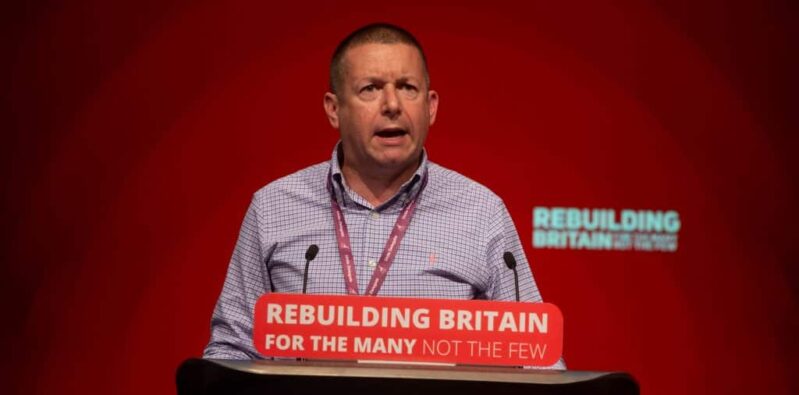

By KD Tait
Three left wing candidates are on the ballot against rightwinger Gerard Coyne in the Unite the Union general secretary election.
The danger posed by Coyne to the struggle over the future direction of Labour and the resistance to the bosses’ offensive means the left must unite behind a single candidate.
The three leftwingers represent a split in the left of the union’s ruling bureaucracy over whether and how the union should intervene in the Labour’s Party’s internal crisis.
Gerard Coyne, who secured 41 per cent of the vote against Len McCluskey in the last election, is the candidate backed by Keir Starmer and the bosses.
While Steve Turner secured the most nominations and the backing of the broad left United Left faction which has run the union for a decade, he has advocated a pragmatic approach to Starmer’s leadership, indicating he will not use the union’s influence to stop Labour’s march to the right.
Sharon Graham, with 349 nominations, campaigned on a pledge to promote a strategy of workplace organising instead of winning influence in Labour. This counterposes a false dichotomy between the ‘trade union’ and ‘political’ class struggle; minimising the latter will leave us fighting with one hand tied behind our backs.
Howard Beckett, with 328 nominations, and the anointed successor of McCluskey, promised a militant fight to defend the gains of the left within Labour, threatening to withhold union funds if Starmer continues to turn to the right and instead expand the union’s strike fund.
Of course this fighting talk must be backed up by action, but with the end of furlough and a vicious fire and rehire offensive threatening jobs, pay and conditions, workers can’t afford to ignore the critical role that Labour can play in supporting our sabotaging action – just look at the way the NEU were sold out by Starmer last year. While the decisive role must be played by rank and file workers taking control of their own disputes and defying the anti-union laws where necessary, the expression of this militancy on the political terrain is the fight to defeat the pro-capitalist leaders of the Labour Party. If we don’t – these leaders will be our enemies on the industrial battlefield.
And if Coyne wins, the bosses’ agents across the labour movement will be on the offensive.
The United Left has presided over a decade of defeat and sellouts from Grangemouth and British Airways to Brexit and Labour Party democracy. This is an indictment of the opportunist broad left strategy pursued by the centrists and Stalinists, which favours a strategic alliance with, and subordination to, the left-talking officials. The consequent atrophy of the grassroots that flows from this approach means that a rank and file candidate was not even presented.
The three candidates are in discussions over whether two should drop out and ask their supporters to back a single candidate. If an agreement is reached, we will vote for the common candidate irrespective of our political criticisms.
That said, we believe socialists should back the candidate whose programme corresponds most closely with the demands of the struggle. None of the candidates have put forward a clear socialist programme, and do not represent a struggle for rank and file control over disputes, policy and officials. But, as we said in the 2017 General Secretary election where we backed McCluskey over Ian Allinson’s creditable but untimely rank and file candidacy – the wider political implications have to be taken into account.
In this election Howard Beckett is the sole candidate not advocating a retreat from the struggle over the political leadership of the Labour Party. Given the centrality of the political struggle to the success of any industrial strategy, we urge a critical vote for Beckett.
Victory in the struggles to come does not ultimately depend on who leads the union, but on whether socialists organise the militant minority in a struggle to transform the union into a class struggle organisation where disputes are controlled by members, and officials subject to regular election and recall. Whoever wins, our goal should be the organisation of socialists committed to the dissolution of the unelected trade union and Labour Party bureaucracies and the building of industrial unions and a socialist party committed to the fight for socialism and workers’ power.